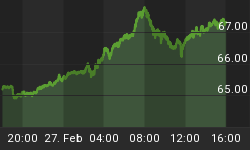In view of the economic crisis facing the American and global markets, the recent strength of the U.S. dollar has confounded analysts. After all, the global economic problems essentially emanate from the United States and one would assume that the collapse of our economy would drag our currency down. That has not, as yet, transpired. The explanation can be found in a financial concept known as deleveraging.
In recessions, cash is short, and businesses and individuals seek to raise cash by any means practical in order to prepare themselves for the tough times ahead. In a world in which U.S. currency is held as the global reserve, cash means U.S. dollars. In short, institutions and individuals are selling any asset that is not nailed down (stocks, corporate bonds, etc.) and buying U.S. dollars. This has resulted in plummeting asset prices and a rising dollar. However, this dynamic cannot exist in perpetuity.
It is completely rational for global financial players to be cautious. The roots of the present economic and financial crisis can be traced to the sort of wild speculation typical of all asset booms throughout history. However, unlike the great speculative asset booms which preceded the Great Crash of 1929/34 or the bursting of the South Sea Bubble in 1720, the boom just recently ended was also characterized by wildly excessive leverage and outright fraud.
Among the financial community, the wild speculation was so reckless that a web of opaque and misleading accounting standards were developed in order to hide the insanity from view. The powerful Wall Street lobby was successful in persuading President Bush to allow it a free hand to push aside the anti-predatory lending rules of some 50 States. This led to an unfortunate marriage of deceptive lending and fraudulent borrowing. Brought to a fever pitch by unbridled speculation, this unholy union gave birth to the sub-prime problem debacle.
Based on the notion that property values would continue to rise while the Fed continued to pump-in U.S. dollar liquidity, even so-called 'prudent' institutions such as banks invested heavily. The high returns led to massive executive bonuses. Many of the loans and investments in real estate were hidden further through the use of derivatives and off-balance sheet accounting. This 'camouflage' was tantamount to fraud. When these loans began to default a credit crisis was unleashed, as the financial 'players' could not trust one another. This led to a credit crisis.
It is wholly rational and necessary that the end of this madness has led to a great deleveraging or economic recession. It is unavoidable that institutions are withdrawing from the market, circling their wagons, and holding tightly to their remaining assets.
Investors, who borrowed cheap and plentiful U.S. dollars to invest abroad, have been forced to sell foreign assets for local currency and buy dollars to repay their debts. Even major corporations are repatriating funds from abroad to meet the domestic dollar cash demands. But the basic cause of the recent asset boom was an excess of U.S. dollars. These opposing forces of dollar demand and oversupply are currently battling for supremacy. At present, demand is in the driver's seat.
However, when the deleveraging subsides the inflationary effects of massive U.S. Government stimuli take effect and show through as rampant inflation. The dollar is then likely to stall and even plummet. Indeed, it is possible that facing depression, newly elected President Obama may devalue the U.S. dollar drastically against gold, just as his 'mentor' President Roosevelt did in 1934, but only after confiscating all privately held gold from American citizens.
In the short-term therefore, the U.S. dollar looks strong, but only in the short-term. Investors should think ahead and not get trapped in U.S. dollars or have their gold holding open to confiscation.
For a more in depth analysis of our financial problems and the inherent dangers they pose for the U.S. economy and U.S. dollar denominated investments, read Peter Schiff's new book "The Little Book of Bull Moves in Bear Markets." Click here to order your copy now.
For a look back at how Peter predicted our current problems read the 2007 bestseller "Crash Proof: How to Profit from the Coming Economic Collapse." Click here to order a copy today.
More importantly, don't wait for reality to set in. Protect your wealth and preserve your purchasing power before it's too late. Discover the best way to buy gold at www.goldyoucanfold.com. Download Euro Pacific's free Special Report, "The Powerful Case for Investing in Foreign Securities" at www.researchreportone.com. Subscribe to our free, on-line investment newsletter, "The Global Investor" at http://www.europac.net/newsletter/newsletter.asp.















